1. Introduction. – 2. Research Methodology. – 3. Misleading Information as a Form of Illegal Content. – 3.1. The Concept of Illegal Content. – 3.2. The Concept of False Information. – 4. The Crime of Receiving Incentives to Publish Illegal Content or False Information. – 4.1. The Material Element (Actus Reus). – 4.1.1. Forms of Criminal Activity. – 4.1.2. Purpose of Criminal Act. – 4.2. The Mental Element (Mens Rea). – 4.2.1. Knowledge. – 4.2.2. Will. – 4.3 The Penalty for the Crime. – 5. Conclusions.
Background: With the rapid digital transformation and the extensive use of social media
platforms, disseminating various forms of harmful digital content—including illegal content
and false or misleading information, particularly when financially incentivised—has become
a pressing global challenge. These practices threaten digital trust and pose significant risks to
societal stability. Despite the growing legal efforts to address these crimes, a unified and
comprehensive legal framework remains lacking. This study examines the criminal liability
associated with paid disinformation in the digital world, comparing the legal approach under
UAE law with the European Digital Services Act (DSA). While the UAE has enacted specific
provisions targeting the monetisation of disinformation, the European framework primarily
focuses on the responsibilities of digital platforms without explicitly addressing individual
actors involved in such activities.
Methods: This study employs a comparative legal analysis, focusing on relevant legislative
provisions in both jurisdictions. The research applies an analytical and comparative
approach, examining Article 55 of the UAE’s Anti-Rumours and Cybercrime Law, which
explicitly criminalises financial incentives for disseminating illegal content. In contrast, the
study assesses the European DSA, which primarily regulates platform accountability but lacks
direct provisions on individual criminal liability for paid disinformation. The analysis also
incorporates doctrinal legal research and case studies to highlight the effectiveness and
limitations of each legal system in combating this issue.
Results and Conclusions: The study finds that UAE law provides a more structured and
detailed legal framework for addressing paid disinformation, offering clear criminal sanctions
for individuals engaged in such acts. Conversely, the European DSA adopts a broader
regulatory approach, focusing on institutional oversight without directly addressing the
criminal liability of individuals involved in monetised disinformation. The research
recommends that European legislation adopt a more specific model to combat these crimes,
integrating direct criminal accountability alongside platform regulation. Additionally, the
study emphasises the need for enhanced international cooperation and regulatory
harmonisation to strengthen digital transparency and mitigate the risks posed by financially
motivated disinformation.

